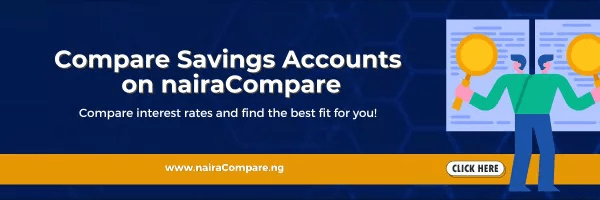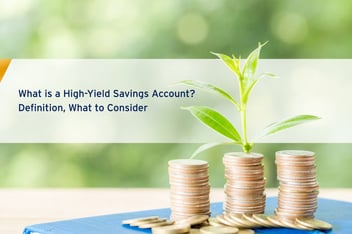
Are Personal Savings Accounts Worth it?
Author Taiwo Temitope-Adesope
If you are serious about saving in 2024, then a personal savings account can serve as a foundational tool for you. A Personal Savings Account is a basic banking product that allows individuals to deposit and store their money securely while earning a modest interest on the balance.
Funds in a personal savings account are accessible, allowing account holders to make withdrawals or deposits as needed. However, there might be limitations on the number of withdrawals per month.
Personal savings accounts are considered low-risk and are typically backed by the Nigerian Deposit Insurance Corporation (NDIC).
Types of Savings Accounts
There are various types of personal savings accounts, each designed to meet different financial needs and goals.
Below are some common types of personal savings accounts you may want to consider.
● Regular Savings Accounts
These are basic savings accounts offered by banks and credit unions. They typically have lower interest rates but are accessible and suitable for general savings needs.
● High-Yield Savings Accounts
High-Yield Savings Accounts (HYSAs) offer higher interest rates compared to regular savings accounts. They are often provided by online banks and may have fewer fees. These accounts are suitable for individuals looking to maximize their savings with a better interest rate.
● Money Market Accounts (MMAs)
Money market accounts are a hybrid between savings and current accounts. They offer higher interest rates than regular savings accounts and may provide limited check-writing abilities. MMAs often have minimum balance requirements.
● Certificate of Deposit (CD)
Certificates of Deposit are time deposits with fixed terms (e.g., 6 months, 1 year, 5 years). They offer higher interest rates than regular savings accounts, but funds are locked in until the maturity date. Early withdrawals may result in penalties.
● Retirement Accounts
Retirement Accounts are tax-advantaged savings accounts designed for retirement. They can hold various types of investments, and contributions may be tax-deductible or tax-free, depending on the type.
● Online Savings Accounts
Online savings accounts are offered by traditional banks with good online presence as well as online banks. They often have competitive interest rates and may come with fewer fees. These accounts provide the convenience of online management.
● Joint Savings Accounts
Joint savings accounts allow two or more individuals to share ownership and access to the account. They are commonly used by couples, family members, or business partners for shared financial goals.
● Children's Savings Accounts
These accounts are designed for minors and are typically opened and managed by a parent or guardian. They can teach children about saving money and financial responsibility.
When choosing a personal savings account, it's essential to consider factors such as interest rates, fees, accessibility, and how well the account aligns with your financial goals.
It's also a good idea to regularly review your accounts to ensure they continue to meet your evolving needs.
When a Personal Savings Account is Worth It
Whether a personal savings account is “worth it” depends on your individual financial goals, circumstances, and preferences.
Some factors to consider when determining if a personal savings account is worth it may include:
1. Emergency Fund
Personal savings accounts provide liquidity, allowing borrowers to quickly access funds in case of unexpected expenses. If you need a safe and easily accessible place to store your emergency funds, a personal savings account is a good option.
2. Short-Term Goals
If you are saving for short-term goals, such as a vacation, a down payment on a house, or a major purchase, a personal savings account can be a suitable choice. It offers a secure place to park your money while earning some interest.
3. Risk Aversion
Unlike investments that carry market risk, personal savings accounts are not subject to market fluctuations. So, if you are risk-averse and prefer a low-risk, stable savings option, it may be worth considering.
4. Accessibility
Easy access to your funds and the flexibility to make withdrawals without restrictions are some features that make personal savings accounts a convenient option. It is a liquid account that allows you to manage your money with ease.
5. Conservative Approach
If you are taking a conservative approach to your finances and are not seeking high returns, a personal savings account aligns with this mindset. While interest rates may be modest, the focus is on stability and security.
When a Personal Savings Account Might Not Be Worth It
On the other hand, personal savings accounts come with downsides that may defeat your savings goals.
You may want to consider the following factors to determine if a personal savings account is not worth it.
1. Low Interest Rates
Personal savings accounts typically offer lower interest rates compared to other investment options. If maximising your return on investment is a primary goal, you may explore alternatives with potentially higher yields, such as investment accounts or certificates of deposit (CDs).
2. Long-Term Goals
For long-term goals like retirement, saving solely in a personal savings account may not be the most efficient strategy. Inflation could erode the purchasing power of your money over extended periods. Consider other investment vehicles for long-term wealth accumulation.
3. Higher Risk Tolerance
If you have a higher risk tolerance and are comfortable with market fluctuations, you might explore investment options with higher potential returns, such as stocks or bonds. These come with more risk but also the potential for higher rewards.
4. Alternative Savings Options
Depending on your goals, there may be alternative savings options that offer more favourable terms. For example, High-Yield Savings Accounts (HYSAs), Certificates of Deposit (CDs), or Money Market Accounts might provide better interest rates or terms.
5. Fees and Requirements
If the personal savings account comes with high fees or stringent requirements, it might not be worth it. Some accounts have monthly maintenance fees or minimum balance requirements, and these could eat into your savings.
Ultimately, the “worth” of a personal savings account depends on your financial objectives and risk tolerance.
It's common for individuals to use a combination of savings and investment vehicles to address short-term and long-term financial needs. It's also advisable to regularly reassess your financial strategy and explore options that align with your evolving goals.
How to Make Your Money Work Harder in a Personal Savings Account
Making your money work harder in a personal savings account involves maximising the return on your savings through strategic decisions.
While personal savings accounts may not offer the highest interest rates, there are ways to optimise your savings.
Here's expert advice on how to make your money work harder in a personal savings account:
● Research and Choose a High-Yield Savings Account
Explore savings accounts that offer higher interest rates. High-yield savings accounts, often provided by online banks, may offer more competitive rates compared to traditional banks. Research different options and choose an account with favourable terms.
nairaCompare has a wide range of personal savings options you can compare and choose from. Visit nairaCompare now and start comparing!

● Take Advantage of Introductory Offers
Some banks offer introductory interest rates or promotions for new customers. Take advantage of these offers but be aware of any changes in rates after the promotional period.
● Consider Online Banks
Online banks typically have lower operating costs than traditional brick-and-mortar banks. As a result, they may offer higher interest rates and lower fees. Consider opening a savings account with a reputable online bank.
● Compare Fees and Terms
Carefully review the fees associated with the savings account. Some accounts may have monthly maintenance fees or charges for specific transactions. Choose an account with minimal fees and favourable terms.
● Automate Regular Contributions
Set up automatic transfers from your salary account to your savings account. Automating regular contributions ensures consistent savings and takes advantage of the power of compounding.
● Build and Maintain an Emergency Fund
Use your personal savings account to build and maintain an emergency fund. Having a financial safety net can prevent you from tapping into other investments or going into debt during unexpected expenses.
● Reinvest Interest Earned
Instead of withdrawing the interest earned on your savings, consider reinvesting it into the account. Reinvesting helps accelerate the compounding effect, allowing your money to grow more quickly over time.
● Review and Adjust Budget
Regularly review your budget to identify areas where you can cut expenses and redirect more funds into your savings account. Consistently increasing your savings contributions can lead to faster wealth accumulation.
● Set Savings Goals
Establish specific savings goals to give your savings a purpose. Whether it's for a vacation, a down payment on a home, or an emergency fund, having clear goals can motivate you to save more consistently.
● Diversify Your Savings Strategy
Consider diversifying your savings strategy by exploring other financial instruments. While a personal savings account provides liquidity and security, other investment options might offer higher returns for long-term goals.
While making your money work harder in a personal savings account is important, it's just one component of an overall financial strategy.
Remember to visit nairaCompare to learn more about savings accounts, strategies and more.
About Author

Taiwo Temitope-Adesope
Taiwo is a passionate storyteller and strategist dedicated to empowering women and crafting compelling narratives. A First-Class graduate in Mass Communication from Covenant University, she specializes in writing, public relations, and digital marketing. As a Content Manager at Suretree, she drove a 50% increase in web traffic through SEO and boosted website engagement by 60% in just four months. Her leadership experience includes serving as Public Relations Officer for the Covenant University Student Council and contributing to impactful volunteer initiatives. With expertise in strategic thinking and business acumen, Taiwo continues to create stories that inspire confidence and imagination.









